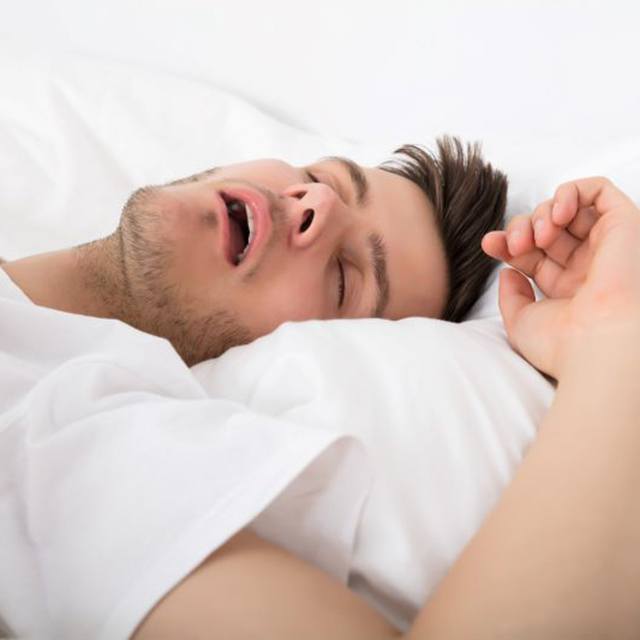Sleep Apnea Therapy – Katy, TX
Better Rest Leads to Better Health
High-quality sleep is one of the pillars of sound overall health. Unfortunately, millions of people suffer from a disorder known as sleep apnea, which destroys the quality of their rest and endangers their well-being. If you have been diagnosed with this condition, or you simply suspect that you have it, contact our practice to learn more about sleep apnea therapy in Katy. We may be able to provide long-term relief via surgical intervention.
Why Choose Piney Point Oral & Maxillofacial Surgery of Katy/Cypress for Sleep Apnea Therapy?
- Long-Lasting Relief through Surgical Intervention
- Experienced, Board-Certified Oral Surgeons
- Viable Option When Conservative Treatments Are Ineffective
What Is Sleep Apnea?
Sleep apnea is a disorder characterized by repeated pauses in breathing throughout the night. There are a few different kinds of sleep apnea, including:
- Obstructive sleep apnea (OSA). This is the most common form of the disorder. It is caused by tissues in the upper airway that overrelax at night and interfere with the flow of air in and out of a patient’s body.
- Central sleep apnea (CSA). This occurs when the brain fails to send proper breathing signals to the body.
- Mixed sleep apnea. Mixed sleep apnea has characteristics of both OSA and CSA.
OSA can cause a range of symptoms, the most common of which is loud, chronic snoring. It can also result in persistent daytime fatigue, morning headaches and sore throats, mood swings, difficulty concentrating, slowed reaction times, and forgetfulness.
The Dangers of Sleep Apnea

While many people dismiss sleep apnea in Katy as a mere annoyance, it is actually a serious threat to an individual’s overall health. Left untreated, it can contribute to a range of systemic conditions. In fact, it is strongly correlated with diabetes, heart attack, stroke, high blood pressure, dementia, and other serious health problems.
Additionally, it can interfere with daily life in a number of ways. For example, the tiredness and mood problems that it causes may adversely affect your relationships with your family, friends, and coworkers. Plus, slowed reaction times can increase your risk of being involved in a motor vehicle accident.
Sleep Apnea Treatment Options

The most common treatment for OSA is a CPAP machine, which uses pressurized air to keep the airway open during sleep. Some patients opt for an oral appliance from a dentist in katy instead, which is often more comfortable and convenient than a CPAP.
But what if such conservative options do not seem to be working for you? You may want to consider getting surgery. Here at Piney Point Oral and Maxillofacial Surgery of Katy/Cypress, we offer a range of procedures that can address the anatomical causes of sleep apnea. For example, we may remove enlarged tonsils or adenoids, help to correct improper jaw positioning, or remove excess tissue in the throat that is interfering with breathing.
Understanding the Cost of Sleep Apnea Therapy

The cost of sleep apnea therapy depends on the details of your unique treatment plan. During your consultation, our team will share some specific numbers with you and help you understand your payment options, such as insurance and/or financing. Rest assured that we want to make the financial aspect of your care as stress-free as possible. Also, keep in mind that treating your sleep apnea is a smart investment in your quality of life and long-term wellness.
Does Dental Insurance Cover the Cost of Sleep Apnea Treatment?

No, dental insurance does not typically cover sleep apnea treatment. Rather, your care is much more likely to be covered by your medical insurance, since sleep apnea is generally classified as an overall health problem rather than an oral health problem.
Factors That Affect the Cost of Sleep Apnea Treatment

Two main factors that affect the cost of treatment include:
- The type of treatment you receive. CPAP therapy and oral appliance therapy are the most commonly prescribed treatments for sleep apnea. They come at different price points. Surgery may cost more, but it is often the best option for severe cases of sleep apnea.
- Your insurance coverage. Medical insurance usually covers sleep apnea testing and treatment. Our team can help you figure out how much you may owe out-of-pocket. We can also assist you with preauthorization and the claims process.
Treat Your Sleep Apnea Now to Improve Your Health

While sleep apnea treatment might seem a bit on the pricey side, it can improve your health and may actually help you save money in the long run. It could do so in a few different ways:
- Improved health. High-quality sleep can lower your risk of numerous systemic conditions, such as high blood pressure, heart attack, and stroke. Therefore, you may be able to save money on overall medical expenses.
- Better quality of life. When you feel good, you can perform better at work and may be able to make more money.
- Lower risk of accidents. Getting enough rejuvenating sleep can lower your risk of being in a painful and expensive car accident.
Making Sleep Apnea Treatment More Affordable

Outside of insurance, another provision that may make your treatment more affordable is financing through CareCredit, a third-party lender. Our team can walk you through the fast and easy application process — it usually takes just a few minutes! Most patients are readily approved for a payment plan that fits within their budget.
Sleep Apnea FAQs

Our expert team in Katy would love to help you find freedom from sleep apnea. Before you book a consultation, however, you may be eager to learn more about your condition and your treatment options. Below, you will find answers to some important FAQs. If your questions are not included here, simply give us a call. We will be happy to help you find the information you are seeking.
Does Everyone Who Snores Have Sleep Apnea?
Snoring and obstructive sleep apnea (OSA) often occur at the same time. That is because the same tissues that vibrate during snoring can also block the airway, leading to episodes of restricted breathing, as well as complete pauses in breathing.
However, it is important to remember that not everyone who snores has sleep apnea. Some people snore only once in a while due to issues like nasal congestion or extreme tiredness. Loud, frequent snoring is a much greater cause for concern than occasional light snoring.
Also, some people experience sleep apnea even though they do not snore.
Can I Diagnose Sleep Apnea on My Own?
Sleep apnea is not self-diagnosable. You should undergo an official sleep test to find out for sure whether you have this condition and how severe it is.
However, you can and should monitor the quality of your sleep. If you believe you have OSA, you may find it beneficial to keep a sleep journal or use an app to track your sleep. The data you collect may help your medical team determine whether you should be referred for a sleep test.
Will My Sleep Apnea Go Away If I Lose Weight?
In some cases, OSA occurs because extra fatty tissue around the neck and abdomen place pressure on the airway, causing problems with breathing. For such individuals, weight loss may reduce or even eliminate OSA symptoms. In many cases, even modest weight loss leads to great improvements. Your primary care practitioner may be able to help you design a reasonable plan for shedding extra pounds.
Of course, weight loss is not always effective for OSA. This disorder can be caused by a range of factors, many of which are completely unrelated to a person’s body weight and composition.
Who Is Most at Risk for Sleep Apnea?
Anyone can develop OSA. However, certain groups are considered high-risk, including:
- Men
- Postmenopausal women
- Overweight and obese individuals
- Pregnant women
- People who smoke
- Individuals with an untreated tongue tie
- People with type 2 diabetes
If you are in a high-risk group, it is important that you pay attention to the quality of your sleep and seek professional assistance if you ever start to exhibit signs of sleep apnea.

